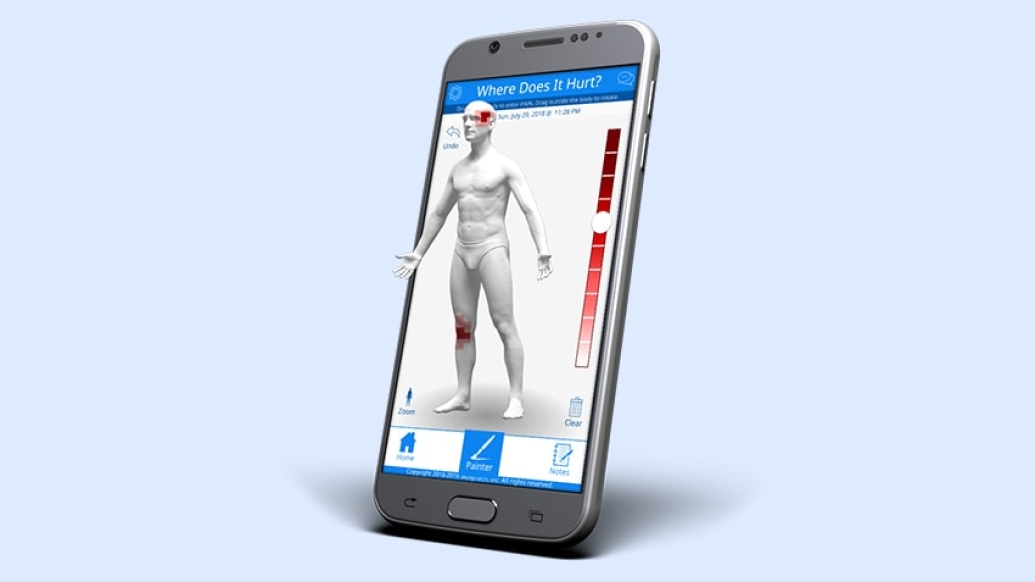Patient-provided data can help doctors and health care professionals gain a more complete picture on pain. See how the technology works.
7:00 AM
Author |

Patients with chronic pain have a new resource when it comes to answering the question: "On a scale of zero to 10, how much does it hurt?"
GeoPain, an app developed by a University of Michigan startup, is designed to help.
LISTEN UP: Add the new Michigan Medicine News Break to your Alexa-enabled device, or subscribe to our daily audio updates on iTunes, Google Play and Stitcher.
By providing a 3D image of the body, the app lets users "paint" their pain on anatomically accurate models to help identify the location and intensity of discomfort — and provide a more objective measurement of pain.
Patients can input factors such as symptoms, triggers and treatments over time for a more comprehensive review.
The aim: to track, analyze and communicate details that might be lost or misinterpreted with existing pain assessment methods.
"We can dissect the pain with greater precision, in one patient or several, and across multiple body locations," says Alexandre DaSilva, D.D.S., D.Med.Sc., an associate professor and director of the Headache & Orofacial Pain Effort Lab at the U-M School of Dentistry. He is also co-founder of MoxyTech, the startup that created GeoPain.
"Whether the patient has a migraine, fibromyalgia or dental pain, we can measure whether a particular medication or clinical procedure is effective for each localized or spread pain condition," DaSilva adds. "GeoPain is a GPS for pain health care."
The free app can be downloaded via Google Play or Apple's App Store and at GeoPain.com. It may be used on a smartphone or tablet.
Connectivity yields benefits
Beyond giving patients greater control of their pain story, the app could disrupt the way drug trials are conducted.
Increased precision and decreased variability of the reporting of pain has potential benefits for pharmaceutical manufacturers. Clinical trials could result in a better understanding of the efficacy of a drug while reducing both the number of patients and time to reach a conclusion.
MORE FROM THE LAB: Subscribe to our weekly newsletter
Initial studies at U-M showed that user-generated GeoPain measurements directly correlated with opioid activity in the brains of chronic pain patients. The app also outperformed traditional measures in complexity and speed by precisely mapping and detecting significant regional changes in pain relief.
"We expect it to revolutionize pain treatment," says Eric Maslowski, co-founder and chief technology officer of MoxyTech.
And it offers another tool for precision health. GeoPain users can record pain details between appointments to build a comprehensive record to share with a doctor. That record also can integrate with a hospital or pain clinic's cloud systems and devices.
"Connected care to patients is a huge technological goal of ours, as is the exchange of pain information with proper permissions and controls," DaSilva says. "Such integrated analytics at patient or population levels would allow us more efficient development and precise evaluation of therapies for pain that chronically affects 100 million adults in the U.S. alone."
The app was created to track pain in patients from DaSilva's brain research and clinical trials in migraine and chronic pain at U-M, many funded by the National Institutes of Health. Several of the research studies involving GeoPain were recently presented at the World Congress on Pain conference in Boston.
[W]e can measure whether a particular medication or clinical procedure is effective for each localized or spread pain condition.Alexandre DaSilva, D.D.S., D.Med.Sc.
Breaking the mold
Gender diversity is another important concept embraced by the GeoPain team, as patients can choose male or female 3D body representations. MoxyTech is also developing pediatric models.
"We want to break the mold," DaSilva says. "All pain matters to us."
SEE ALSO: App Guides Breast Cancer Patients Through Treatment
MoxyTech licensed the technology from the university and then worked with the U-M Office of Technology Transfer to optimize the app for the business sector. The company plans to market the app's data analytics to clinicians, health care systems and pharmaceutical companies for use in developing better treatments for pain.
GeoPain is also being tested at several clinics in Michigan with positive feedback.
"Patients appreciate the ability to color in their pain pattern on the tablet," says Tiziano Marovino, DPT, a clinical research physical therapist and practitioner at Chronic Pain Solutions in Ypsilanti, Michigan. "They are more aware of pain location, nature, intensity, duration and frequency. This appears to increase self-efficacy by providing a greater sense of control over their pain."
That sentiment could have a big payoff by prompting GeoPain users to be more active in their care.
"Instead of trying to recall pain during a visit with their physician, patients can record the intensity and location of their pain as it occurs," says Lynn Johnson, Ph.D., a professor at the U-M Dental School. "This has never been possible before."

Explore a variety of health care news & stories by visiting the Health Lab home page for more articles.

Department of Communication at Michigan Medicine
Want top health & research news weekly? Sign up for Health Lab’s newsletters today!





